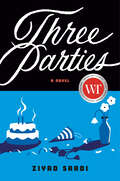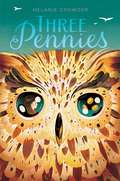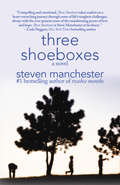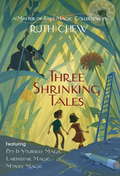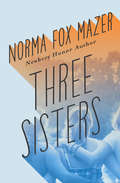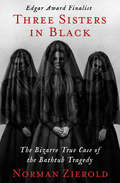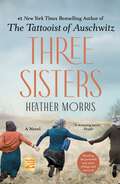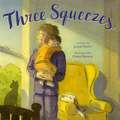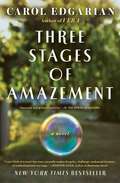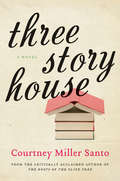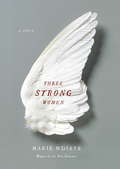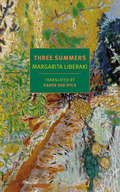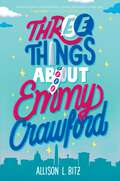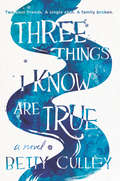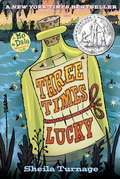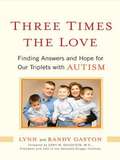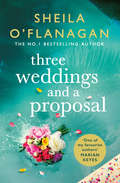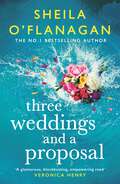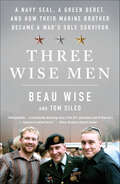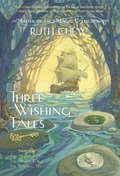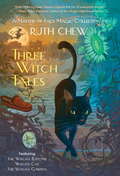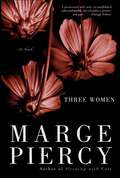- Table View
- List View
Three Parties
by Ziyad SaadiA queer Palestinian refugee plans to come out at his elaborate birthday dinner party in this tragicomic modern reimagining of Virginia Woolf&’s Mrs. Dalloway.Firas Dareer wakes up on his twenty-third birthday with a sense of purpose: today he&’ll jump from a Stage 3 to a Stage 6 in his self-determined Coming Out Scale, professing his sexuality to a captive audience of immediate and extended family, friends, acquaintances, coworkers, and neighbours. But despite the meticulously designed invitations, carefully chosen place settings and floral centerpieces, painstakingly curated playlist, and agonizingly fretted-over menu, factors begin to spin out of his control.Threatening to thwart his big moment are his younger brother, whose mental fragility requires him to be monitored at all times; his cantankerous grandfather, who&’s just completed his third escape from the retirement home; the Dareers&’ embittered housekeeper (and Firas&’s arch nemesis), who could scoop the story before he gets the chance; his harried boss, who on this of all days calls him into work at the architecture firm, where his colleagues share a talent for butchering his name; and his mother, whose accidental text message may have blown the cover of an illicit extra-marital affair. There&’s also the fact that Firas too has found himself in a love triangle of sorts, choosing between soft and steady Tyrese and fiery Kashif, who makes a sport out of demonstrating how Palestinian he is.As the future Firas has precisely architected for himself slips further out of his grasp, the past comes crashing in like a wrecking ball. Sharp, darkly funny, and full of surprises, Three Parties pays twisted homage to a literary classic, gleefully upends the western coming-out narrative, and sensitively explores the traumas and pressures faced by Palestinian immigrants—all in the span of a single life-changing day.
Three Pennies
by Melanie CrowderA girl in foster care tries to find her birth mother before she loses her forever in this spare and beautifully told novel about last chances and new opportunities.For a kid bouncing from foster home to foster home, The Book of Changes is the perfect companion. That’s why Marin carries three pennies and a pocket-sized I Ching with her everywhere she goes. Yet when everything in her life suddenly starts changing—when Marin lands in a foster home that feels like somewhere she could stay, maybe forever—the pennies don’t have any answers for her. Marin is positive that all the wrongs in her life will be made right if only she can find her birth mother and convince her that they belong together. Marin is close, oh so close—until she gets some unwelcome news and her resolve, like the uneasy Earth far beneath the city of San Francisco, is shaken.
Three Shoeboxes
by Steven ManchesterThe latest emotional rollercoaster of a novel from a master of tearjerkers and family fiction. Mac Anderson holds life in the palm of his hand. He has a beautiful wife, three loving children, a comfortable home, and a successful career. Everything is perfect—or so it seems. Tragically, Mac is destined to learn that any sense of security can quickly prove false. Because an invisible enemy called Post Traumatic Stress Disorder has invaded Mac’s fragile mind and it is about to drop him to his knees. He does all he can to conceal his inner chaos, but to no avail. Left to contend with ignorance, an insensitive justice system, and the struggles of an invisible disease, he loses everything—most importantly his family. One shoebox might store an old pair of sneakers. Two shoeboxes might contain a lifetime of photographs. But in Three Shoeboxes, a father’s undying love may be just enough to make things right again. "Compelling and emotional, Three Shoeboxes takes readers on a heart-wrenching journey through some of life's toughest challenges, always with the ever-present sense of the transforming power of love and hope. Three Shoeboxes is Steve Manchester at his finest." – Carla Neggers, New York Times bestselling author “In Three Shoeboxes, Steven Manchester chronicles a seemingly strong marriage and loving family that suddenly begins to crack and fragment under the weight of guilt and old secrets. It’s psychologically accurate, well-plotted, and a sensitive, honest portrayal of what it’s like to have a long-buried past finally surface, and what that reckoning does to everyone involved.” – Mark Sullivan, #1 New York Times bestselling author, Beneath a Scarlet Sky “Raw, moving, and brutally honest—Steven Manchester takes you on an emotional rollercoaster. Grab your tissues for this heart-wrenching story—better yet, grab a box full!” – Tanya Anne Crosby, New York Times and USA Today bestselling author, The Girl Who Stayed “Three Shoeboxes is a compassionate, accessible portrait of a vitally important topic, PTSD, how it affects the sufferer and the family—and how to find hope and healing.” – Jenna Blum, New York Times and international bestselling author, Those Who Save Us and Storm Chasers “Three Shoeboxes will linger in your thoughts long after that last page. Steven Manchester has brilliantly woven a story that will touch your heart, twist your emotions, and remind you why he is easily one of your favorite authors.” – Steena Holmes, New York Times and international bestselling author, Emma’s Secret: A Novel
Three Shrinking Tales: A Matter-of-Fact Magic Collection by Ruth Chew
by Ruth ChewFor decades, Ruth Chew's classic chapter books full of everyday magic have enchanted early readers. Now a new generation can fall under her spell and fall in love with reading. This e-collection turns tiny magic into big surprises! In Do-It-Yourself Magic, a special "Build Anything" kit makes imagined settings come to life. In Earthstar Magic, a slow summer turns upside down when a clumsy witch's spells go awry. And in Mostly Magic, enchanted objects lead two siblings and a mysterious cat into a series of miniature adventures. "Ruth Chew's classic books capture the joy of everyday magic." -- Mary Pope Osborne, author of the Magic Tree House series
Three Sisters
by Norma Fox MazerHow's a girl supposed to know when she's in love--and more importantly, how does she get out of it? One remarkable older sister would be bad enough, but Karen Freed has two: Liz, a beautiful poet, and Tobi, compellingly intense and argumentative. Karen knows she couldn't possibly compete, but it would be nice to be known for something of her own. The three have been inseparable all through Karen's childhood, but now her sisters have moved into a world that Karen can't yet share, and their blossoming romances make her feel left out. Karen wishes some of their romance would rub off on her. She has Davey, but he's more best friend than love interest, and despite his many advances, Karen knows it wasn't meant to be. Is something wrong with her? Will she even know when love comes her way? Then she falls head over heels for someone she definitely can't have: Scott, Liz's boyfriend. Her feelings cause a rift between her and Liz, one that Karen might not be able to fix. But if anything has ever brought these three sisters together, it's coming to one another's rescue.
Three Sisters in Black: The Bizarre True Case of the Bathtub Tragedy
by Norman ZieroldIn 1909, a bathtub drowning became one of the most famous and bizarre criminal cases in American history. On November 29, 1909, police were called to a ramshackle home in East Orange, New Jersey, where they found the emaciated body of twenty-four-year-old Oceana “Ocey” Snead facedown in the bathtub—dead of an apparent suicide by drowning. There was even a note left behind. But it would not take authorities long to discover that Ocey’s death was no suicide. And Ocey’s own mother and two aunts were far from the sorrowful caretakers they appeared to be. In fact, behind the veils of their strange black mourning clothes, they were monsters, having tormented Ocey almost since birth in a sick pattern of both physical and mental abuse, after a lifetime of which the women planned to cash in on poor Ocey’s sad and inevitable death. An Edgar Award finalist, Three Sisters in Black is the true story of a gothic, gaslight nightmare that fascinated, shocked, and baffled the nation—and the disturbed women who almost got away with murder.
Three Sisters: A Novel
by Heather MorrisFrom Heather Morris, the New York Times bestselling author of the multi-million copy bestseller The Tattooist of Auschwitz and Cilka's Journey: a story of family, courage, and resilience, inspired by a true story.Against all odds, three Slovakian sisters have survived years of imprisonment in the most notorious death camp in Nazi Germany: Auschwitz. Livia, Magda, and Cibi have clung together, nearly died from starvation and overwork, and the brutal whims of the guards in this place of horror. But now, the allies are closing in and the sisters have one last hurdle to face: the death march from Auschwitz, as the Nazis try to erase any evidence of the prisoners held there. Due to a last minute stroke of luck, the three of them are able to escape formation and hide in the woods for days before being rescued.And this is where the story begins. From there, the three sisters travel to Israel, to their new home, but the battle for freedom takes on new forms. Livia, Magda, and Cibi must face the ghosts of their past--and some secrets that they have kept from each other--to find true peace and happiness. Inspired by a true story, and with events that overlap with those of Lale, Gita, and Cilka, The Three Sisters will hold a place in readers' hearts and minds as they experience what true courage really is.
Three Squeezes
by Jason PrattWhen you could neither talk nor standlife’s hourglass still filled with sand,I gently held your tiny handand gave it three soft squeezes.When you awoke within the nightAnd cried from fear and called for light,I held you safe with all my mightand gave you three long squeezes.Follow a father and his son from babyhood to baseball games to graduation and beyond in this loving saga about the unbreakable bond between generations.A perfect gift, Three Squeezes is a tender, rhyming picture book that is an ode to the love between parent and child, no matter how old the child (or) parent is.
Three Stages of Amazement: A Novel
by Carol EdgarianA sweeping, richly compassionate novel about marriage, ambition, and the reclaiming of love—by the bestselling novelist and co-founder of Narrative magazine. Many love stories end in marriage; rare is the love story that begins with one— already promised, already worn. Set in San Francisco during the first year of Obama’s presidency, Three Stages of Amazement deftly charts the struggles and triumphs of Lena Rusch and her husband Charlie Pepper, who still believe they can have it all—sex, love, marriage, children, career, brilliance. But life delivers surprises and tests—a stillborn child, an economic crash, a ruthless business rival, and the attentions of an old lover. Touched by tragedy and by ordinary hopes unmet, Lena and Charlie must face, for the first time in their lives, real limitation. Fifteen years after her stunning debut, Rise the Euphrates, Carol Edgarian has created a panoramic and deeply moving story about business and family and the demands of love in our time. Three Stages of Amazement takes readers on a spellbinding journey inside America today, with an unforgettable cast of characters including Cal Rusch, Lena’s uncle, a Silicon Valley titan, and Ivy, his socialite wife, who engender complication in the lives of all the people they touch: their grown children, business partners, friends, the servants and workers upon whom their glamorous life depends—and Lena, whose quest for grace is the pulse of this gorgeous novel. As Lena and Charlie, Ivy and Cal face the temptations of their youth and the fantasy of starting over, they discover that real life is the ultimate challenge. Told with eloquence, wit, and compassion, Three Stages of Amazement is a true thriller of the heart, a riveting story about confronting adversity, gaining wisdom, and finding great love.
Three Story House
by Courtney Miller SantoAs they renovate a historic Memphis house together, three cousins discover that their spectacular failures in love, career, and family provide the foundation for their future happiness in this warm and poignant novel reminiscent of The Postmistress and The Secret Life of BeesApproaching thirty and trying to avoid the inescapable fact that they have failed to live up to everyone's expectations as well as their own aspirations, cousins and childhood best friends Lizzie, Elyse, and Isobel seek respite in an oddly shaped, three-story house that sits on a bluff sixty feet above the Mississippi River.As they work to restore the nearly condemned house, each woman faces uncomfortable truths about her own failings. Lizzie seeks answers to a long-held family secret about her father in their grandmother's jumble of mementos and the home's hidden spaces. Elyse's obsession with an old flame leads her to a harrowing mistake that threatens to destroy her sister's wedding. And Isobel's quest for celebrity tempts her to betray confidences in ways that could irreparably damage her two cousins.This sharply observed account of the restoration of a house built out of spite but filled with memories of love is also a tale of friendship and a lesson in how relying on one another's insights and strengths provides the women with a way to get what they need instead of what they want.
Three Strong Women
by Marie Ndiaye John FletcherIn this new novel, the first by a black woman ever to win the coveted Prix Goncourt, Marie NDiaye creates a luminous narrative triptych as harrowing as it is beautiful. This is the story of three women who say no: Norah, a French-born lawyer who finds herself in Senegal, summoned by her estranged, tyrannical father to save another victim of his paternity; Fanta, who leaves a modest but contented life as a teacher in Dakar to follow her white boyfriend back to France, where his delusional depression and sense of failure poison everything; and Khady, a penniless widow put out by her husband's family with nothing but the name of a distant cousin (the aforementioned Fanta) who lives in France, a place Khady can scarcely conceive of but toward which she must now take desperate flight. With lyrical intensity, Marie NDiaye masterfully evokes the relentless denial of dignity, to say nothing of happiness, in these lives caught between Africa and Europe. We see with stunning emotional exactitude how ordinary women discover unimagined reserves of strength, even as their humanity is chipped away. Three Strong Women admits us to an immigrant experience rarely if ever examined in fiction, but even more into the depths of the suffering heart.
Three Summers
by Margarita LiberakiA tender story about three sisters coming of age in Greece over the course of three summers, now available after being out of print for over twenty years. Three Summers is the story of three sisters growing up in the countryside near Athens before the Second World War. Living in a big old house surrounded by a beautiful garden are Maria, the oldest sister, as sexually bold as she is eager to settle down and have a family of her own; beautiful but distant Infanta; and dreamy and rebellious Katerina, through whose eyes the story is mostly observed. Over three summers, the girls share and keep secrets, fall in and out of love, try to figure out their parents and other members of the tribe of adults, take note of the weird ways of friends and neighbors, worry about and wonder who they are. Karen Van Dyck’s translation captures all the light and warmth of this modern Greek classic.
Three Things About Emmy Crawford
by Allison L. BitzIn this coming-of-age novel perfect for fans of Lynn Painter and Rebecca Lynn Solomon, nothing can derail Emmy Crawford, the type-A daughter of a senator, from relentlessly pursuing her dreams—not Crohn’s disease, the paparazzi, or even heartbreak. "Emotional, sweet, and ridiculously swoony, this book is a must-read." —Lynn Painter, New York Times Bestselling Author of Better Than the MoviesThere are three things high school senior Emmy Crawford will accomplish, no matter what: Taking Nationals in debate this season.Shielding her sister, Issy, from anything that could hurt her, especially her anxiety.Representing her family well, since her mom may be the next president.And nothing can get in Emmy's way. Not Crohn’s disease, even if her gut has been acting up. Not the paparazzi, who snap any photos they can get of the daughters of a presidential candidate. And definitely not her feelings for Gabe Castillo, the only debater in DC who stands a chance at beating her—and who she used to be on secret kissing terms with, before he ghosted her. When Gabe unexpectedly returns to the debate scene and Issy starts crushing on him, Emmy works harder than ever to keep her eyes on winning and off her aching heart and body, because the alternative means losing the three things that matter most.
Three Things I Know Are True
by Betty CulleyFans of Jandy Nelson and Marieke Nijkamp will love this deeply moving novel in verse about the aftermath of a gun accident. <P><P>Life changes forever for Liv when her older brother, Jonah, accidentally shoots himself with his best friend Clay’s father’s gun. Now Jonah needs round-the-clock care just to stay alive, and Liv feels like she’s the only person who can see that her brother is still there inside his broken body. <P><P>With Liv’s mom suing Clay’s family, there are divisions in the community that Liv knows she’s not supposed to cross. But Clay is her friend, too, and she refuses to turn away from him—just like she refuses to give up on Jonah. <P><P>This powerful novel is a stunning exploration of tragedy, grief, compassion, and forgiveness.
Three Times Lucky (Mo & Dale Mysteries #1)
by Sheila TurnageRising sixth grader Miss Moses LoBeau lives in the small town of Tupelo Landing, NC, where everyone's business is fair game and no secret is sacred. She washed ashore in a hurricane eleven years ago, and she's been making waves ever since. Although Mo hopes someday to find her "upstream mother," she's found a home with the Colonel--a café owner with a forgotten past of his own--and Miss Lana, the fabulous café hostess. She will protect those she loves with every bit of her strong will and tough attitude. So when a lawman comes to town asking about a murder, Mo and her best friend, Dale Earnhardt Johnson III, set out to uncover the truth in hopes of saving the only family Mo has ever known. <P><P> Full of wisdom, humor, and grit, this timeless yarn will melt the heart of even the sternest Yankee.<P> Newbery Medal Honor book
Three Times You (The Rome Novels)
by Federico MocciaFrom an internationally bestselling author comes the powerful and poignant final book in his Rome Novels trilogy, following two soulmates whose lives will be intertwined forever—perfect for fans of Reminders of Him and In Five Years. Step Mancini has more than any man has a right to ask for. He has succeeded beyond his wildest dreams as a television producer and can afford to surround himself with beautiful things, including his lawyer wife. And now his life is even more perfect because they have a baby on the way. But there&’s nothing like the magic of first love. When Babi Gervasi suddenly reappears in Step&’s life, she brings back tender memories along with a shocking request for his help. Step knows that his wife can never find out, and so he begins a double life, torn between the two women he cares about most in the world.
Three Times the Love: Finding Answers and Hope for Our Triplets with Autism
by Randy Gaston Lynn GastonThe powerfully moving story of one family's journey toward healing their triplet sons with autism Lynn and Randy Gaston were overjoyed to discover they were having triplets after many arduous years of trying to conceive. <P><P>But at eighteen months, the boys began exhibiting odd new behaviors-among them, toe-walking, arm-flapping, and in Nicholas, a sudden muteness. Terrified and dumbfounded, Lynn began researching their behavior on the Internet. The same glaring diagnosis kept popping up-each boy was displaying symptoms of autism, though each at a different point on the spectrum. Receiving little support from their own pediatrician, Randy and Lynn hired their own therapists and began intensive behavioral treatment, not covered by their health insurance. <P>Offering invaluable advice that ranges from educational programs to legal issues to a comprehensive assessment of the therapies and interventions that have worked for their three unique children, Three Times the Love provides a road map for all families who will need to follow them through the trenches. Filled with practical advice and an extensive resource list, it is an essential guide for any family touched by autism.
Three Weddings and a Proposal: One summer, three weddings, and the shocking phone call that changes everything . . .
by Sheila O'FlanaganFROM THE AUTHOR OF THE NO. 1 BESTSELLERS THE WOMEN WHO RAN AWAY AND THE MISSING WIFEAt the first wedding, there's a shockThe second wedding is unexpected By the third, Delphie thinks nothing could surprise her. But she's wrong . . . Delphie is enjoying her brother's wedding. Her surprise last-minute Plus One has stunned her family - and it's also stopped any of them asking again why she's still single. But when she sees all the missed calls that evening, she knows it can't be good news. And she's right. Delphie has been living her best life, loving her job, her friends, her no-strings relationships and her dream house by the sea. Now she has to question everything she believed about who she is and what she wants. Is her mum right - is it time to settle down? Or does she want to keep on trying to have it all? Each wedding of a glorious summer brings a new surprise. And as everything Delphie thought she had is threatened, she has the chance to reshape her future . . . 'One of my favourite authors' Marian Keyes'Sheila's books always make you feel as if you've spent time with a good friend' Carole Matthews
Three Weddings and a Proposal: One summer, three weddings, and the shocking phone call that changes everything . . .
by Sheila O'FlanaganFROM THE AUTHOR OF THE NO. 1 BESTSELLERS THE WOMEN WHO RAN AWAY AND THE MISSING WIFEDelphine is at a wedding when the shocking news comes. Suddenly her life changes for ever . . . Delphine has worked hard for her success and she knows she's got everything she wants. But not everyone agrees. Her opinionated family aren't convinced that living alone with no plans to 'settle down' could possibly make her truly happy, and no one appreciates it when she drops everything, day or night, whenever her boss Conrad calls. Yet Delphine wouldn't change a thing. And when Conrad makes her a surprise offer, it's clear that her hard work is going to pay off.A few short days later, Delphine's life is unrecognisable. The man who once broke her heart has suddenly reappeared, and a shocking tragedy turns her world on its head.Delphine must rethink everything that matters to her, and to those around her, and decide, once and for all, if love, family and a little compromise should come before career, security and independence . . . and if she's prepared to make that choice.(P)2021 Headline Publishing Group Ltd
Three Weddings and a Proposal: One summer, three weddings, and the shocking phone call that changes everything . . .
by Sheila O'FlanaganSunday Times bestseller April 2022Irish Times bestseller March 2022At the first wedding, there's a shockThe second wedding is unexpected By the third, Delphie thinks nothing could surprise her. But she's wrong . . . Delphie is enjoying her brother's wedding. Her surprise last-minute Plus One has stunned her family - and it's also stopped any of them asking again why she's still single. But when she sees all the missed calls that evening, she knows it can't be good news. And she's right. Delphie has been living her best life, loving her job, her friends, her no-strings relationships and her dream house by the sea. Now she has to question everything she believed about who she is and what she wants. Is her mum right - is it time to settle down? Or does she want to keep on trying to have it all? Each wedding of a glorious summer brings a new surprise. And as everything Delphie thought she had is threatened, she has the chance to reshape her future . . . 'One of my favourite authors' Marian Keyes'Sheila's books always make you feel as if you've spent time with a good friend' Carole Matthews
Three Weddings and a Proposal: One summer, three weddings, and the shocking phone call that changes everything . . .
by Sheila O'FlanaganSunday Times bestseller April 2022Irish Times bestseller March 2022At the first wedding, there's a shockThe second wedding is unexpected By the third, Delphie thinks nothing could surprise her. But she's wrong . . . Delphie is enjoying her brother's wedding. Her surprise last-minute Plus One has stunned her family - and it's also stopped any of them asking again why she's still single. But when she sees all the missed calls that evening, she knows it can't be good news. And she's right. Delphie has been living her best life, loving her job, her friends, her no-strings relationships and her dream house by the sea. Now she has to question everything she believed about who she is and what she wants. Is her mum right - is it time to settle down? Or does she want to keep on trying to have it all? Each wedding of a glorious summer brings a new surprise. And as everything Delphie thought she had is threatened, she has the chance to reshape her future . . . 'One of my favourite authors' Marian Keyes'Sheila's books always make you feel as if you've spent time with a good friend' Carole Matthews
Three Wise Men: A Navy SEAL, a Green Beret, and How Their Marine Brother Became a War's Sole Survivor
by Tom Sileo Beau WiseFrom Beau Wise and Tom Sileo comes Three Wise Men, an incredible memoir of family, service and sacrifice by a Marine who lost both his brothers in combat—becoming the only "Sole Survivor" during the war in Afghanistan.Shortly after the 9/11 attacks, three brothers by blood became brothers in arms when each volunteered to defend their country. No military family has sacrificed more during the ensuing war, which has become the longest ever fought by America’s armed forces.While serving in Afghanistan, US Navy SEAL veteran and CIA contractor Jeremy Wise was killed in an al Qaeda suicide bombing that devastated the US intelligence community. Less than three years later, US Army Green Beret sniper Ben Wise was fatally wounded after volunteering for a dangerous assignment during a firefight with the Taliban. Ben was posthumously awarded the Silver Star, while Jeremy received the Intelligence Star—one of the rarest awards bestowed by the U.S. government—and also a star on the CIA’s Memorial Wall. United States Marine Corps combat veteran Beau Wise is the only known American service member to be pulled from the battlefield after losing two brothers in Afghanistan. Told in Beau’s voice, Three Wise Men is an American family’s historic true story of service and sacrifice.
Three Wishing Tales: A Matter-of-Fact Magic Collection by Ruth Chew
by Ruth ChewFor decades, Ruth Chew's chapter books about matter-of-fact magic have enchanted early readers. Now a new generation of fantasy fans can discover the magic in these Stepping Stones books.What should be in a book about magic? Pirates? Merlin? Becoming tiny? Time travel? A giant? How about all of the above? In The Wishing Tree, The Magic Coin, and The Magic Cave, magical adventures lie around every corner. From a coin that becomes a boat and a backyard pool that becomes an ocean, to a cave that leads to another land, it's anchors away to fun!Ruth Chew has a remarkable way of turning the average day into a fantastic voyage. Here are three of her best tales that will capture the imagination of any reader who is willing to take a little risk.
Three Witch Tales: A Matter-of-Fact Magic Collection by Ruth Chew
by Ruth Chew"Ruth Chew's classic books perfectly capture the joy of everyday magic."--Mary Pope Osborne, bestselling author of the Magic Tree House seriesRuth Chew's chapter books are full of simple, matter-of-fact magic that's sure to enchant budding fantasy readers.Did that cat just talk to me? Did that button just move? Is that flower petal flying? In Witch's Cat,The Witch's Buttons, and The Witch's Garden, children learn lots of things about magic . . . from traveling to the time of knights and ladies, to shrinking to the size of a blade of grass. Magic is fun, but it's also hard, and there always seem to be consequences. Ruth Chew's children loved stories about witches, and she figured that other children would love them too . . . and they do. Here are three of her best, each full of fanciful fun and magical mayhem.
Three Women: A Novel
by Marge PiercySuzanne Blume has known success and disappointment in equal measure. A respected lawyer who survived two marriages and put two children through college, she now faces the disquieting prospect of her wayward older daughter moving back home. But more troubling still is the news that her mother, a woman of legendary independence who has never truly accepted her daughter nor approved of her choices, has been felled by age and illness. And, for the first time in her life, she needs Suzanne's help.Intertwining the lives of three generations of contemporary women, master storyteller Marge Piercy plunges into the deepest, most elemental basics of life -- love, aging, illness, and death -- and emerges with a brave, compassionate exploration of the volatile ground between mothers and daughters.
